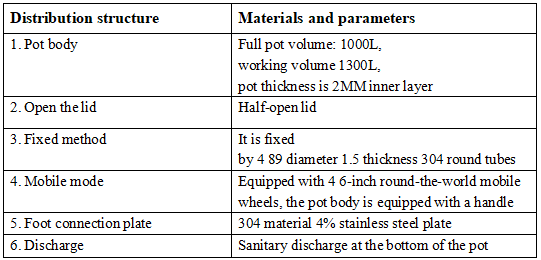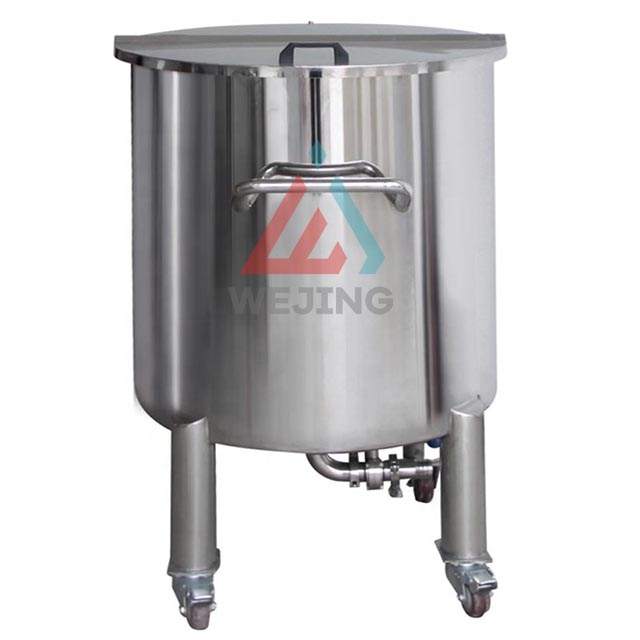Product Advantage:
1. Corrosion resistance: Stainless steel materials have good corrosion resistance and can resist the erosion of most chemical substances, including strong acids, strong alkalis, etc.
2. High temperature resistance: Stainless steel materials can work stably for a long time in high temperature environments, with a maximum temperature of over 800 ℃.
3. High strength: Stainless steel materials have high strength and can withstand significant pressure and weight.
4. Good sealing performance: Stainless steel storage tanks have good sealing performance, which can effectively prevent liquid or gas leakage.
5. Easy to clean: The surface of stainless steel is smooth, not easy to adhere dirt, and easy to clean.
6. Recyclability: Stainless steel material is a recyclable material that can be recycled and meets environmental requirements.
Technical Parameters:

Product Uses:
1. Chemical industry: Stainless steel storage tanks are widely used in the chemical industry to store various corrosive liquids and gases. For example, storing strong acids, bases, salt solutions, organic solvents, etc. Due to its excellent corrosion resistance, stainless steel materials can ensure the purity and quality of stored substances.
2. Pharmaceutical industry: In the pharmaceutical industry, stainless steel storage tanks are commonly used to store pharmaceutical raw materials, intermediates, and finished products. The corrosion resistance and cleanliness of stainless steel materials can meet the hygiene and purity requirements of the pharmaceutical industry.
3. Food industry: Stainless steel storage tanks are also widely used in the food industry to store various liquid and semi-solid foods, such as milk, fruit juice, sauces, syrups, etc. The corrosion resistance and easy cleaning of stainless steel materials can ensure food safety and hygiene.

Product Operate Guide:
1. Selection of storage materials:
Stainless steel storage tanks can store various liquids and gases, but suitable stainless steel materials need to be selected based on the properties of the stored substances. Different stainless steel materials have different corrosion resistance and high temperature resistance, which need to be selected according to the actual situation.
2. Installation and fixation:
Before installation, stainless steel storage tanks need to undergo basic design and construction to ensure that the foundation is flat and firm. During the installation process, it is necessary to use professional installation tools and techniques to ensure that the storage tank is installed firmly and stably.
3. Use and maintenance:
When using stainless steel storage tanks, it is necessary to comply with relevant safety operating procedures and not exceed the design pressure and temperature. Regularly inspect and maintain storage tanks, and promptly address any issues found.
4. Cleaning and disinfection:
Stainless steel storage tanks need to be regularly cleaned and disinfected to ensure the quality and safety of stored materials. During the cleaning and disinfection process, appropriate cleaning agents and disinfectants should be used, and highly corrosive chemicals should not be used.
5. Safety precautions:
When using stainless steel storage tanks, safety precautions should be taken, such as not storing flammable and explosive materials around the tank, and not welding or other operations on the tank.
FAQ:
Q: What are stainless steel tanks used for?
A: Stainless steel tanks are commonly used for storing liquids and gases in various industries, such as chemical, food and beverage, pharmaceutical, and oil and gas. They are preferred for their durability, corrosion resistance, and ability to maintain the quality of the stored substances.
Q: What types of stainless steel are used to manufacture tanks?
A: Different grades of stainless steel can be used, depending on the application and requirements. Common grades include 304, 316, and 316L, which offer varying levels of corrosion resistance and mechanical properties.
Q: How are stainless steel tanks fabricated?
A: Stainless steel tanks can be fabricated using various methods, such as welding, rolling, and forming. The manufacturing process may involve cutting, bending, and joining the stainless steel sheets or plates to create the desired tank shape and dimensions.
Q: Are stainless steel tanks suitable for storing corrosive substances?
A: Yes, stainless steel tanks are highly resistant to corrosion, making them suitable for storing corrosive substances such as acids, alkalis, and chemicals. However, the specific grade of stainless steel used may need to be selected based on the corrosiveness of the substance.
Q: Can stainless steel tanks be customized to meet specific requirements?
A: Yes, stainless steel tanks can be customized to meet specific storage volume, dimensions, and configuration requirements. Customization options may include adding agitators, pumps, valves, and instrumentation.




















